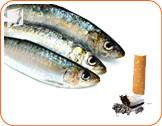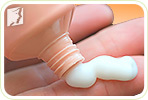
It may be hard to believe that the instigator of your recent skin battles might be menopause. Believe it or not, the hormonal imbalances that accompany this change of life can begin up to 10 years before menopause begins. This time is called perimenopause, and the difference between it and premenopause is often misunderstood.
You may not have noticed your hormonal imbalances if it hadn't been for the appearance of symptoms like irritated skin. These symptoms generally have to do with a deficiency of estrogen in your body. Estrogen has many jobs in your system, among them stimulating the generation of skin collagen.

Collagen is a major proponent of skin's firmness and moisture. It also protects your skin from environmental pollutants. In order to maintain healthy skin, there are several habits that can make a big difference.
How to Keep your Collagen
So now that you know what causes itchy skin during menopause, how do you stop it? Treating dry skin can take a combination of lifestyle changes and natural remedies. Things that can help you improve your skin include:
Get Out of the Sun

The sun's rays can significantly damage your dermis -- the middle layer of your skin -- and this is where collagen is stored.
Hydrate
Water can help replenish the moisture your skin loses throughout the day to environmental factors. This can help collagen stay strong.
Don't Smoke

Smoking prevents the synthesis of collagen. Collagen keeps skin firm, a.k.a. wrinkle-free. You may have noticed how many extra wrinkles long-term smokers have.
Eat More Fish
Of course a balanced, varied diet is necessary to maintain overall health, but fish is particularly good for the promotion of collagen because it possesses a healthy dose of protein.
Eat Citrus

Vitamin C is one of the most widely used anti-aging products in the world. The reason? Vitamin C is both an antioxidant, protecting your skin from free radicals in the environment, and a stimulant of the production of collagen.
More Information
Talk with your doctor about testing your hormone levels to confirm you are entering perimenopause. During this time, it is helpful to be aware of your fluctuating hormone levels and the resulting symptoms so that you can effectively treat them. For more information on irritated skin during menopause and how to treat it, follow the links below.
Sources
- BMJ Group. "Menopause: What is it?" Patient Leaflet. 2007
- Hutchinson, Susan M.D. "The Stages of a Woman's Life: Menstruation, Pregnancy, Nursing, Perimenopause, Menopause." November 2007.
- Love, Susan M.D. Menopause and Hormone Book. New York: Three Rivers Press, 2003.


